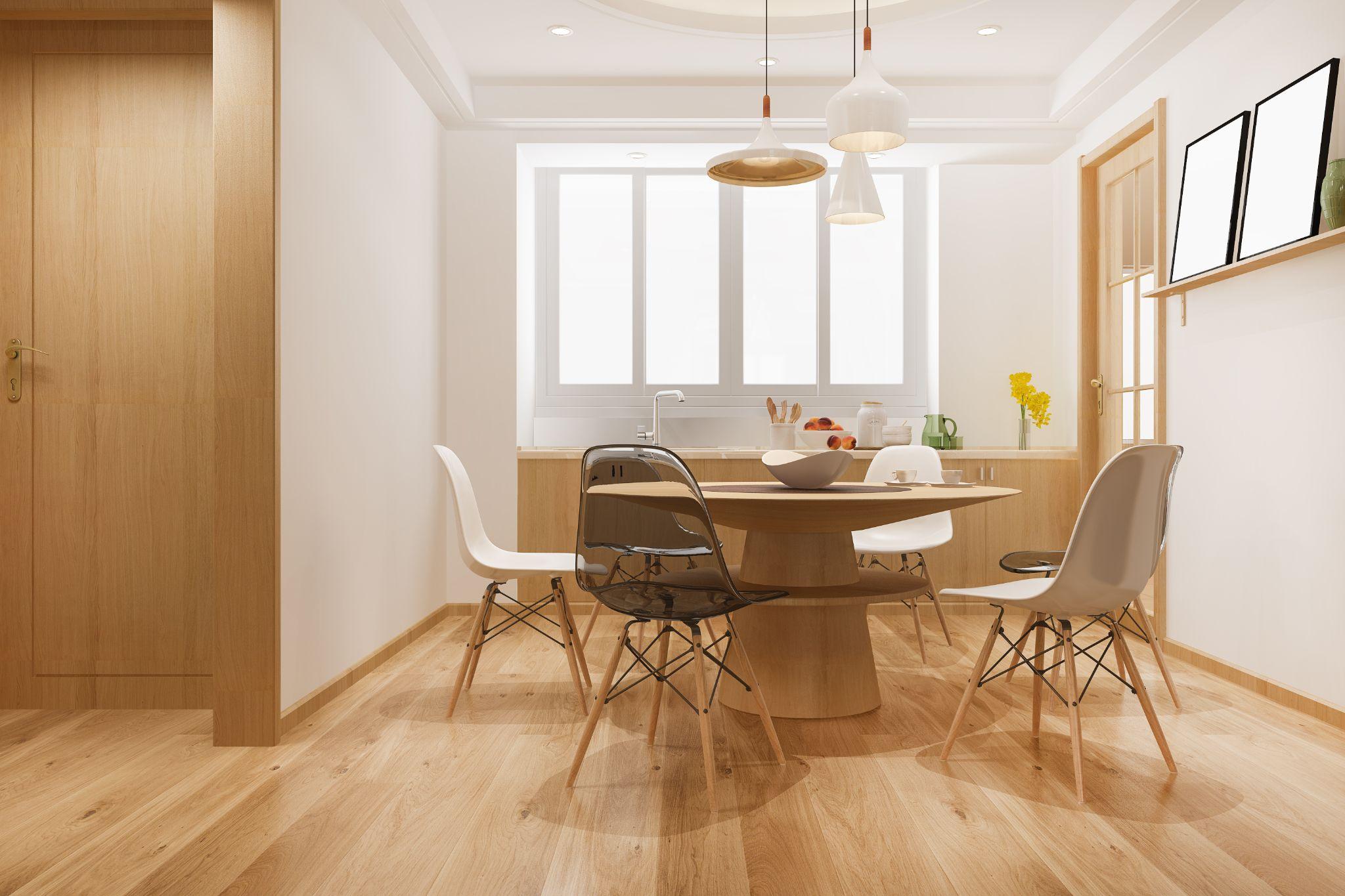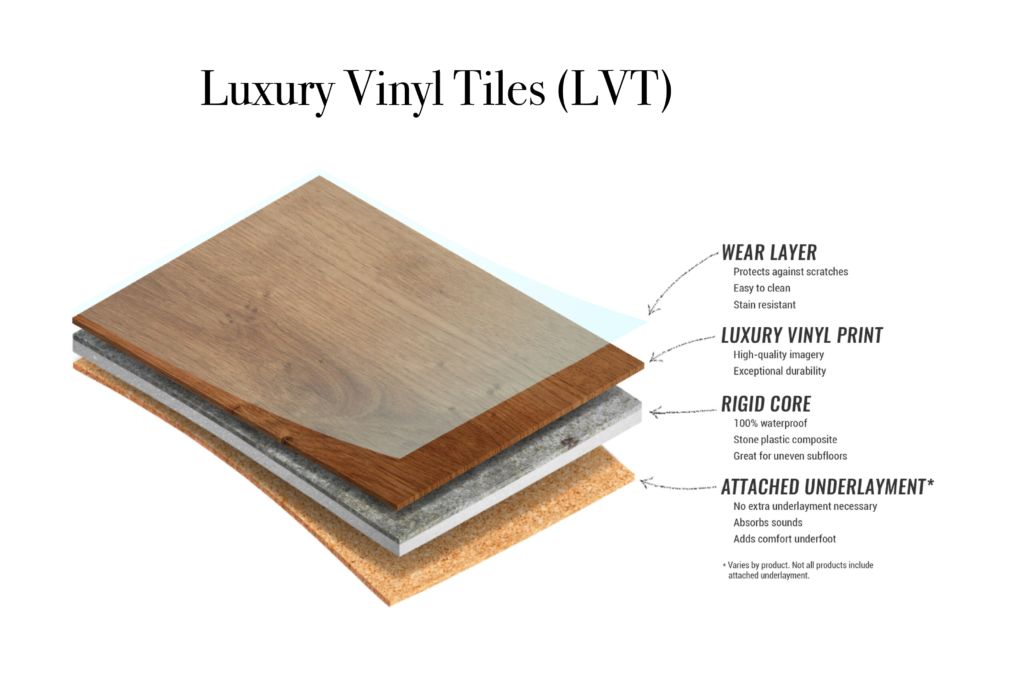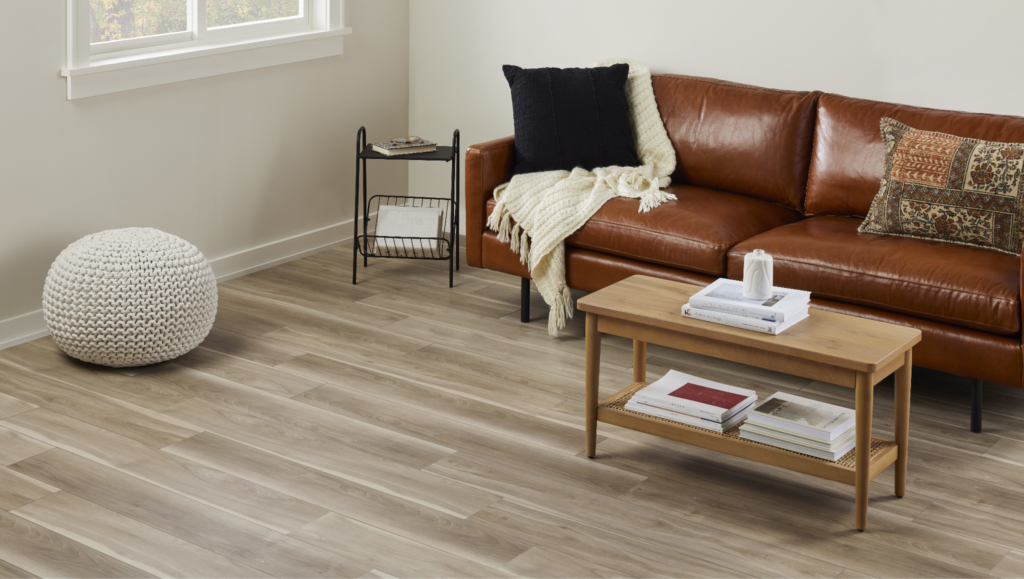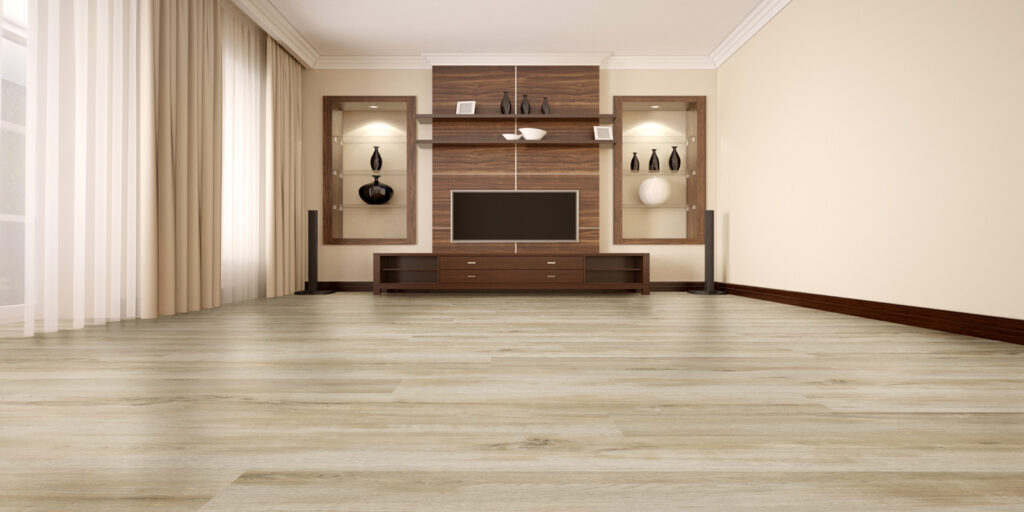
Luxury Vinyl Tile (LVT) flooring is a versatile and practical option that can mimic the appearance of real wood or stone while offering numerous benefits. LVT is a relatively new product in the flooring market but has quickly gained popularity. It is often chosen over laminate flooring or tiles, especially in areas prone to water exposure. While water-resistant laminate flooring has been introduced for bathrooms, LVT still remains a favorable choice. Commonly known as “Click Vinyl” or “luxury vinyl tiles,” LVT flooring is available in tile or plank shapes.
So, how is LVT flooring manufactured? Luxury vinyl tiles are typically made from multiple layers of PVC vinyl. These layers are mixed with various compounds to achieve the desired hardness. Through a rolling process, the multiple sheets of PVC vinyl are compressed and suspended in a liquid. Heat and air are then applied to dry the material, resulting in tough vinyl sheets. The top layer of LVT flooring can also feature an embossed finish, adding depth to mimic the grooves found in natural stone or wood.
After the manufacturing process, LVT floors receive a clear vinyl and urethane coating, which enhances protection and comfort. The layers are compressed together, and a decorative printed vinyl layer is bonded to the surface, providing additional comfort and warmth. Rigid LVT boards, which are thicker, often incorporate a click system to facilitate do-it-yourself installations.
In recent years, there have been developments in green technology that aim to improve the manufacture of LVT flooring. Some manufacturers now use recycled plastics and even wood in the core materials. Additionally, cork underlays are being incorporated into certain LVT products.
You may wonder why LVT floors are relatively thin compared to other flooring options. LVT flooring can range from 4mm to 8mm in thickness, with top layers typically ranging from 0.3mm to 0.5mm. Although this may seem thin compared to laminate floors, which are commonly 7-12mm thick, the high density and strength of compressed vinyl make it unnecessary to increase the thickness.
A 5mm layer of compressed vinyl is stronger than an 8mm layer of HDF (High Density Fiberboard) wood, making LVT flooring more than adequate for heavy traffic commercial installations. Moreover, the thinner profile of LVT ensures minimal disruption to existing fixtures such as skirting boards and shower trays.
LVT flooring is suitable for a wide range of applications. Due to its PVC composition, it is particularly ideal for areas prone to moisture, such as bathrooms, kitchens, and even commercial spaces like hair salons and yoga studios. The multiple layers of LVT provide stability, preventing moisture absorption and expansion due to water exposure.
There are two primary methods for installing LVT flooring: the loose lay click system and the glue-down system. The loose lay click system is similar to installing laminate flooring and requires a specialized LVT underlay. On the other hand, the glue-down system involves using specific LVT glues. Regardless of the installation method, it is crucial to have a completely level sub-floor. If you’re unsure about the installation process, professional flooring companies such as Vinyl FLooring Singapore Ltd.
LVT flooring offers several advantages, making it a popular choice among homeowners and businesses. These benefits include:
- Waterproof: LVT flooring is highly resistant to water damage, making it suitable for moisture-prone areas.
- Great durability: The strength and density of LVT make it highly durable and capable of withstanding heavy traffic.
- Warmer than tiles and laminate: LVT provides better insulation and warmth compared to traditional tiles and laminate flooring.
- Softer than tiles and laminate: LVT has a softer feel underfoot, making it more comfortable to walk on compared to tiles and laminate.
- Limitless colors: LVT offers a wide range of color options, allowing for customization and flexibility in design choices.
- Ideal for commercial and residential installations: LVT’s durability and water resistance make it suitable for both commercial and residential applications.
- Green technology: Some LVT brands, like Egger’s “Greentec” LVT, incorporate greener technologies, such as using recycled materials, promoting sustainability.
In conclusion, LVT flooring provides a practical and aesthetically pleasing alternative to traditional flooring options. Its manufacturing process involving PVC layers and the application of various coatings ensures durability, water resistance, and comfort. With advancements in green technology, LVT is becoming more sustainable. Whether for residential or commercial use, LVT flooring offers numerous benefits and is a popular choice for those seeking a reliable and visually appealing flooring solution.




Pingback: SPC VS LVT Vinyl Flooring - Vinyl Flooring Singapore LTD
Pingback: What is SPC Flooring? - Vinyl Flooring Singapore LTD
Pingback: 10 Things You Need to Know Before Buying Vinyl Flooring - Vinyl Flooring Singapore LTD
Pingback: How to Determine the Quality of Vinyl Flooring - Vinyl Flooring Singapore LTD